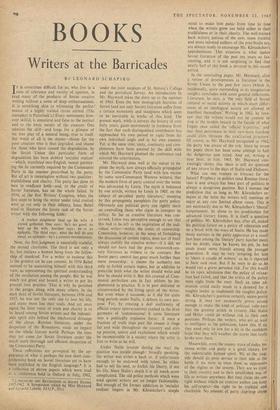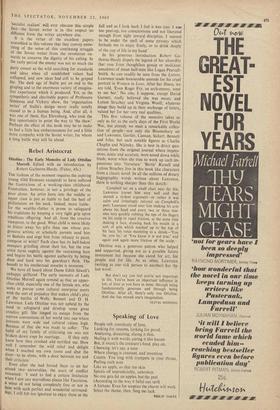BOOKS
Writers at the Barricades
By LEONARD SCHAPIRO •
IT is sometimes difficult for us, who live in a state of tolerance and variety of opinion, to read many of the products of Soviet creative writing without a sense of deep embarrassment. It is something akin to witnessing the perfor: mance of a highly trained circus animal. (The metaphor is*Pasternak's.) Every movement, how- ever skilful, is unnatural and false to the instinct and to the basic nature of the creature. One admires the skill—and longs for a glimpse of the free play of a natural being, true to itself. But worst of all is the shame—shame for the poor creature who is thus degraded, and shame for those who have caused the degradation. In the Soviet Union this particular form of degradation has been dubbed 'socialist realism' —which, translated into English, means portray- ing the lie currently required by the Communist Party in the manner prescribed by the party. But all art is meaningless without two qualities: truthfulness and charity. The party has done its best to eradicate both—and, to the credit of Soviet literature, has on the whole failed. In 1934, at the first Writers' Congress, when the first steps to bring the writer under total control were as yet only in their infancy, Isaac Babel tried to illustrate the future task of the Soviet writer with the following fable: A worker neighbour beat up his wife. A crowd gathered. One says: he's no good, he beat up his wife. Another says: he is an epileptic. The third says: what the hell do you mean, an epileptic—he's a counter-revolutionary.
Now, the first judgment is essentially truthful, the second charitable. The third is not only a lic, but outlaws a human being from the fellow- ship of mankind. For a writer to endorse this is the greatest sin he can commit. In 1934 Babel seemed to be associating himself with this third view, as representing the spiritual understanding of the revolution among the people. But he was much too great and honest a writer to put his precept into practice. That is why he perished in the purges along with many others. In the dark days of Soviet literature, between 1936 and 1953, he was not the only one to lose his life, and many more lost their- souls. And yet, once again the faint voice of truth and charity is to be heard among Soviet writers and the indomit- able spirit stirs behind the mechanical dressage of the circus. Russian literature, under the despotism of the Romanovs, made an impact on the whole literate world. Perhaps the -time may yet come for Soviet literature under the much more thorough and efficient despotism of the Communist-Party.
These reflections are prompted by the ap- pearance of what is perhaps the best short com- prehensive book on Soviet literature yet to have been published in the English language.* It is a- collection of eleven papers which were read a: 3 conference held in Oxford in July, 1962,
1: I ERATURE AND REVOLUTION IN SOVIET RUSSIA
1917-1962. A Symposium edited by Max Hayward and Leopold Labedz. (O.U.P., 25s.)
under the joint auspices of St. Antony's College and the periodical Survey. An introduction by Mr. Hayward takes the story up to the summer of 1963. Even the best monograph histories of. Soviet (and not only Soviet) literature suffer from a certain monotony and stodginess which seem to be inevitable in works of this kind. The present work, while it surveys the history of over foity years, gains enormously in freshness from the fact that each distinguished contributor has approached his own period or topic from his own individual angle and in his own manner. Yet, at the same time, unity, continuity and com- pleteness have been assured by the skill with which Mr. Hayward planned the conference and selected the contributors.
Mr. Hayward does well at the outset to ex- plode the myth, now always officially propagated by the Communist Party (and with less excuse by some non-Communist Western writers), that the modern form of party control over the writer was advocated by Lenin. The myth is bolstered by one article, written by Lenin in 1905, on the subject of so-called 'party literature,' meaning by this propaganda pamphlets for party policy. Obviously any political party can rightly insist on controlling those who claim to interpret its policy. So far as creative literature was con- cerned, Lenin was perceptive enough to see that this had to be left to the inspiration of the indi- vidual writer—within the limits of censorship. Censorship, however, in the sense of forbidding the discussion of certain topics, does not of itself always stultify the creative writer—if it did, we should not have had the great nineteenth-cen- tury literature as witness to the contrary. But Soviet party control has gone much further than mere censorship: it claims the authority not only to forbid certain topics, but in addition to prescribe both what the writer should write and how he should write it. But this counsel of Com munist perfection can in fact seldom be im- plemented in practice. It is in part defeated or circumvented by the living spirit of the writer. But even when it succeeds, as it did for quite long periods under Stalin, it defeats its own pur- pose. For, by creating a dull uniformity of official vranye (prevarication) clothed in the drab garments of 'commissarese' it turns literature into a politically explosive force: if once a fraction of truth slips past the censor it rings far and wide throughout the country and stirs up passion, unrest and excitement which would be inconceivable in a society where the artist is free to write as he will.
Under Stalin (except during the war) the position was simple enough : broadly speaking, the writer was either a hack or, if unfortunate enough to be endowed with talent, he either had to sell his soul, or forfeit his liberty, if not his life. Since Stalin's death it is all much more complicated. The old police methods which were used against writers are no longer fashionable. But enough of the former addiction to 'socialist realism' lingers in Mr. Khrushchev's simple mind to make him panic from time to time when the writers grow too bold either in their truthfulness or in their charity. The well-trained hack writers, jealous of the new, more truthful and more talented authors of the post-Stalin era, are always ready to encourage Mr. Khrushchev's apprehensions. This situation is what makes Soviet literature of the past ten years so fas- cinating, and it is not surprising to find that nearly half of this book is devoted to this recent period.
In the concluding paper, Mr. Hayward, after a review of developments in literature' in the Soviet Union in the past few years (which is, incidentally, quite outstanding in its imaginative insight), concludes with some general reflections. Literature,. he says, is 'the only field of Soviet cultural or social activity in which overt differ- ences of an ideological nature are allowed to manifest, themselves' Writing iti 1962, he fore- saw that the writers would not be content to stop at the modest breach in the façade of what Engels once called the 'official hypocrisy,' and that their persistence in their new-born freedom could even threaten the totalitarian structure. Of course, as Mr. Hayward recognised in 1962, the party was aware of the risk. Since he wrote his paper there has been some attempt to 'halt the dangerous new trend. And yet, writing a year later, in July, 1963, Mr. Hayward con- vincingly shows that there is still no question of any return to the days of Stalin and Zhdanov.
What can one venture to forecast for the future? Prophecy in politics (and Russian litera- ture is and always has been part of politics) is always a dangerous pastime. But I venture the prediction that as long as Mr. Khrushchev re- mains at the helm the writers will continue to enjoy at any rate limited elbow room. This is not necessarily due to Mr. Khrushchev's 'liberal' temperament, let alone to his predilection for advanced literary forms. It is itself a question of politics. Mr. Khrushchev has, after all, staked his political future on a policy of relaxation and on a break with the ways of Stalin. He has made many enemies in the party apparatus as a result (not least among the 'literary' party hatchet men), but no doubt, since he knows his job, he has made many more friends among the younger generation. It may be very tempting for him to 'shoot a couple of writers,' as he is reported to have said once. But if he were to do so he would run a grave personal risk. For this would be an open admission that the policy of relaxa- tion had failed, and that the critics of the policy were right from the start. Such an open ad- mission could easily result in a demand for a tougher leader to implement the tougher policy. Mr. Khrushchev's position certainly seems pretty strong. It may not necessarily prove strong enough to make the kind of political yoke-face that the greatest artists in tyranny like Stalin and Hitler could do without risk to their own positions. Perhaps the writers, who are at least as intelligent as the politicians, know this. If so, they need only lie low for a bit in the confident hope that they will weather the storm that lately; .broke over them.
Meanwhile, even the uneasy truce of today be- tween writer and party is a great victory for the indomitable human spirit. We at the ring- side should do poor service to their side in the battle if we were to treat them as opponents of the regime or the system. They are as loyal to their country and to their established way of life as writers anywhere. But they claim the one right without which no creative author can keep his self-respect—the right to be truthful and charitable. No amount of party clap-trap about
'socialist realism' will ever obscure this simple fact—the Soviet writer is in this respect no different from the writer anywhere else.
It is the virtue of the excellent papers assembled in this volume that they convey some- thing of the sense of this continuing struggle of the Soviet writer from the revolution on- wards to conserve the dignity of his calling. In the early period the enemy was not so much the party censor as the wild searching for standards and ideas when all established values had collapsed, and new ideas had still to be groped for. The dark age of Stalin put an end to the groping and to the enormous variety of imagina- tive experiment which it produced. Yet, as the sympathetic and charitable papers of Professors Simmons and Vickery show, the 'organisation writer' of Stalin's design never really totally ceased to be a human being. And, after all, it was one of them, Ilya Ehrenburg, who took the first opportunity to point the way to 'the thaw.' Perhaps the effect of this book may be to make us feel a little less embarrassment for and a little more sympathy with the Soviet writer, for whom a long battle may still lie ahead.



































 Previous page
Previous page